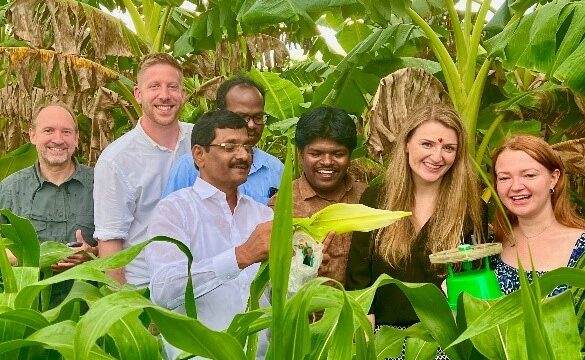
CABI has led a ‘training of trainers’ for plant protection experts on the diagnosis and sustainable management of the fall armyworm crop pest in the Kurdistan Region of Iraq to help ensure greater protection of livelihoods and food security.
The fall armyworm (Spodoptera frugiperda) was reported from maize fields in Iraq in 2021. This caterpillar pest may pose a risk to several crops, as the region tries to diversify its crops and value chains beyond wheat and potato.
Of American origin, the fall armyworm has invaded every maize producing region in the world over the last two decades. Its caterpillars excessively feed on maize – often nearly destroying plants completely where they are not treated.
Endanger food security
This can endanger food security of a country. Moreover, fall armyworms are known to feed on several crops, which can vary from region to region. It is still to be seen what impact the pest might have on maize and other crops of the Kurdistan region of Iraq.
To help the region to become better prepared for the management of this pest, and to potentially contain its invasive populations, a set of plant protection experts was trained as local trainers.
Dr Stefan Toepfer, CABI’s fall armyworm expert, led the training to build the capacity of trainers of the Directorate of Agriculture, the University of Duhok, as well as from Kurdistan Holland company in the diagnosis and management of this pest.
It is anticipated that the newly trained trainers will be able to spread the knowledge and build the capacity of other stakeholders and that farmers can be correctly advised in the sustainable management of the fall armyworm.

It is possible for this pest to be effectively controlled
Dr Toepfer said, “The fall armyworm can be a disastrous pest if not correctly and timely managed. It is still to be seen how populations can build up on the climatic and farming conditions of Iraq”
“However, there are several non-chemical pest management options available as well as least toxic chemical options. If the pest is well understood, and management options correctly chosen and applied, it is possible for this pest to be effectively controlled whilst minimizing the risks to farmers and the environment.”
The training was delivered as part of the CABI-led project “Value chain development for potato and processing in the Kurdistan Region of Iraq’, which is funded by The Netherlands Enterprise Agency on behalf of The Dutch Ministry of Foreign Affairs.
CABI and partners including the Directorate of Agriculture of Duhok, the University of Duhok, and private sector organizations HZPC and KH company will help enhance potato cultivation and post-harvest activities.
The project is also aiming at building the capacity of extension workers for improved services to farmers on diversity of crops, improved crop production, and marketing.
Additional information
Main image: Dr Stefan Toepfer leads the training of plant protection experts to sustainably manage the fall armyworm pest in the Kurdistan Region of Iraq.
Donors
The Netherlands Enterprise Agency on behalf of the Dutch Ministry of Foreign Affairs
Partners
CABI
KH Ltd
HZPC Holland BV
Directorate of Agriculture (Ministry of Agriculture & Water Resources Duhok)
University of Duhok
Relevant story
‘Public-private partnership to unlock potato sector potential in the Kurdistan Region of Iraq.’
See also a story posted by the Duhok Agricultural Extension Directorate on their Facebook page here.
Publications
Morphology and Molecular Diagnosis of Fall Armyworm in Iraq
Pest management decision guides for fall armyworm can be found here.
Project page
Find out more about CABI’s work on the ‘Value chain development for potato and processing in the Kurdistan Region of Iraq’ from the project page here.
Related News & Blogs
Biological control in action: Zambia’s field days on fighting fall armyworm
Experts from CABI recently held two field days and an expo in Zambia, showcasing innovative approaches to pest management to 584 farmers, agro-dealers and other stakeholders to help raise awareness of approaches to tackle the invasive fall armyworm (Sp…
11 June 2025




